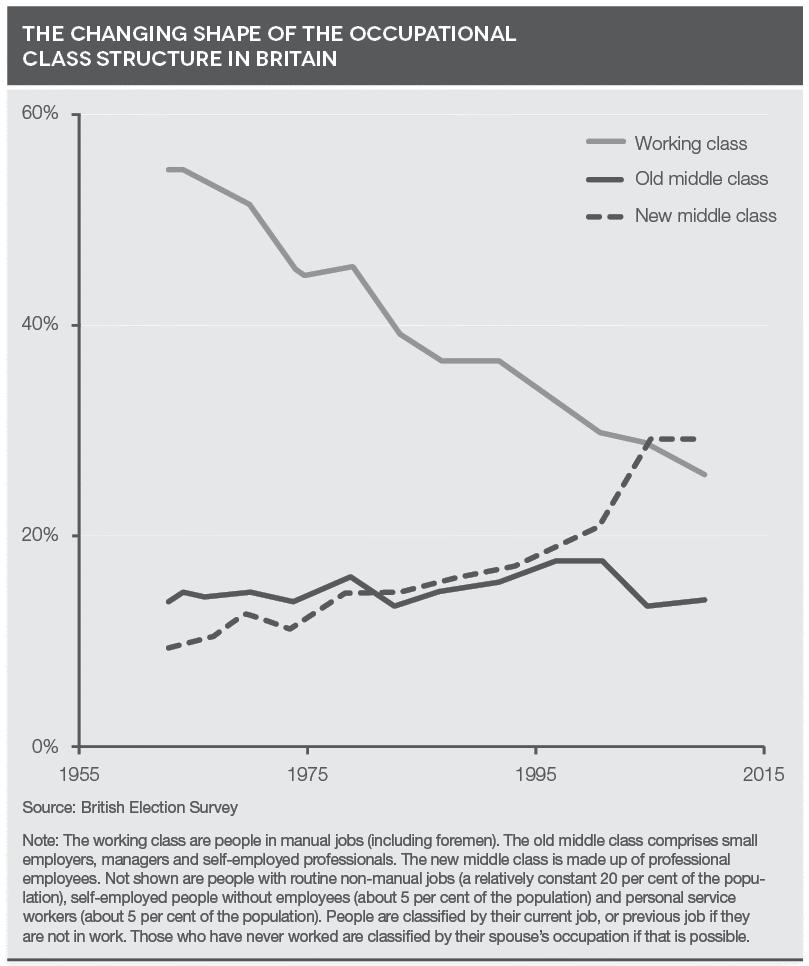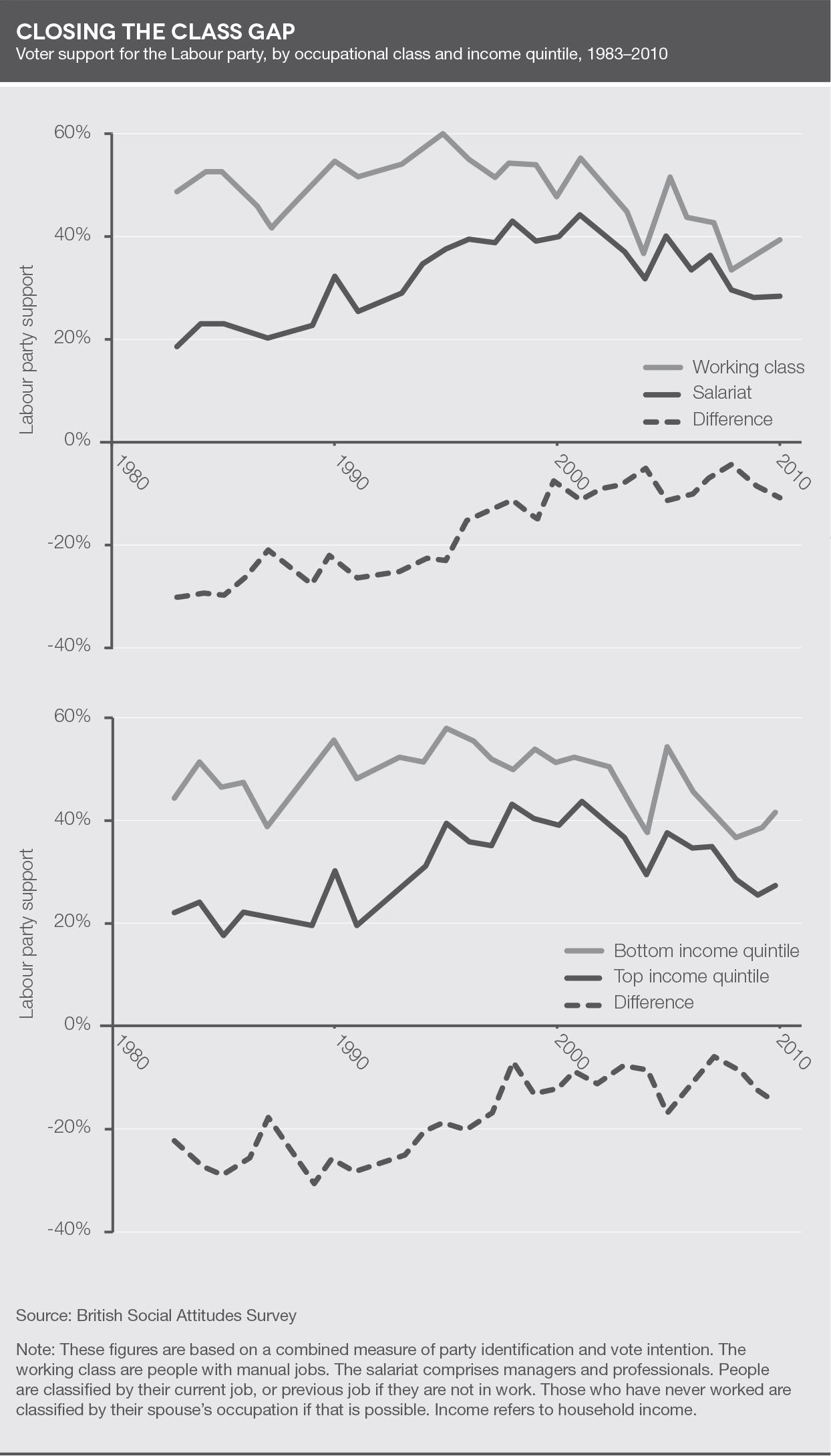The new class war: Excluding the working class in 21st-century Britain
The impact of political exclusion: 'The new class war is not being waged by the working class but against them'Article
The mid-20th century saw the rise of the working class. Whether you were an angry young man of the 1950s literary scene, or a working-class hero of '60s pop culture, it was good to be working class. People were proud of their working-class status and working-class background.
But times have changed. Today, the politics and social norms of 21st-century Britain are about working-class marginalisation rather than working-class pride. The factors that have underpinned this change have led to political disillusion and non-participation. They have also, though to a lesser degree, boosted support for non-mainstream parties like Ukip among the working class, as they have increasingly been deserted by mainstream politicians. How and why has this happened?
Relatively worse off: a new picture of class by comparison
Class has held the central position in studies of British politics since early research into voting behaviour conducted in the 1960s. Most academics since then have focussed on the descriptive question of whether class voting has declined and the implications for politics of this decline. The main argument made is that class no longer matters, that the distinctions between the working and middle classes have blurred, and that individualisation is the key attribute of modern, post-industrial societies. As a result, parties no longer need to connect with differences in interests between classes. The blurring of social divisions has produced a blurring of political divisions.
However, these claims do not fit well with the facts. The most significant feature of the post-industrial class structure is not its disappearance, but the changing sizes of its classes. Inequalities have not only survived but have in some respects increased. Although attention has been focussed on the growth of a socially microscopic but financially bloated super-rich group, the more substantial political change has been in the relative size of the working class.
Using data from the British Election Study, figure 1 shows the numbers of people in different occupational social classes over time. It is quite clear that whereas the main point of division in the past was between a large and fairly homogenous working class and a small middle class, now it is between a larger group of heterogeneous middle classes and a smaller working class. There are now more people in the 'new middle class' (essentially professional workers, many in the public sector) than in the working class. The transition from a majority working-class society to a minority working-class society has multiple implications: some psychological, some political.
Figure 1

One key idea here is relative group size. The concept of relative deprivation was used by Gary Runciman to interpret why people accepted class inequalities in the 'big working class' Britain of the 1960s, but has until now not been used to understand new class divisions. Gauging relative deprivation requires a reference group against which social comparisons can be made. In the mid-20th century, when the working class was the numerically dominant group in society – in the 1950s manual workers made up nearly 60 per cent of the population – the presence of a small elite was not a major source of negative social comparison. To be working class is not problematic when most people are in the same situation. However, as the class structure has changed shape, leaving a smaller group at the bottom of the hierarchy, it has become difficult to avoid more unfavourable comparisons.
This process parallels the one identified in Samuel Stouffer's classic studies of the US military. When about half of US air force personnel were promoted, those who were not responded negatively, because they felt 'left behind'. By comparison, only one in 10 of the military police were promoted, so for those who missed out it was less of a problem to have 'failed'. To extend this analogy: people of the working class previously accepted their situation on the basis of comparison with the majority of the population, when the majority of the population lived in similar circumstances. That is no longer the case. To be working class nowadays is to be, in effect, a loser in a more unequal and socially differentiated society.
This does not refer only to the obvious lack of resources: it has a psychological component as well. We know that people typically make social comparisons that enhance their self-esteem. The majority of the population now has an identifiable minority group – typically referred to as the 'white working class' – that can be legitimately looked down upon. This is especially so in a society where interracial or interfaith disparagement is at best discouraged and at worst illegal.
The twist in the tale is that, psychologically, it is less costly for those in disadvantaged situations to see such outcomes as just. In consequence, it is often the disadvantaged themselves who are most critical of others who are disadvantaged, adding a further source of negative appraisal. So although the working class in Britain has not (yet) been self-defined in the 'white trash' vernacular that many in the US seem to have accepted, we do find, for example, that the harshest critics of people on welfare are often those who are by dint of their class position most vulnerable to having to claim it themselves. Whereas 40 per cent of people with working-class occupations agree that many people on welfare benefits should not be helped, this is only true of 20 per cent of those in professional occupations.
This kind of 'punitive', or at least unreceptive, perspective is not restricted to welfare. Changing attitudes to social issues that are badges of progress for many on the progressive left are anathema to many in the working class. As the bulk of the educated middle-class population have become more liberal, the views of the working class have become more distinctively divorced from mainstream opinion, especially with regards to the issues of immigration and EU integration. At the same time, class divisions around economic issues remain robust. People's views on the market economy are still consistently related to class, with the working class wanting more interventionist and redistributive policies. To put it bluntly, poor people want the state to be redistributive and protectionist, and rich people don't.
Camping on the centre-ground: towards a classless politics?
Overall, the changing size of Britain's social classes has either not affected the distinctiveness of those classes in terms of their political views, or it has exacerbated those differences. Rather, it is the changing distribution of voters that has produced a shift of focus towards the political centre by those who seek votes. The Labour party found it could no longer base its electoral success primarily on working-class support, and the Conservative party responded, eventually, in part by targeting this same centre-ground. In some respects, then, we have seen a compression of the range of views represented in Westminster. This is not a new conclusion, but many of its implications have remained unexamined.
In the 1990s, both left and right claimed Britain was witnessing the end of class politics. John Major, shortly after taking over leadership of the Conservative party in 1990, declared he wanted to produce a 'genuinely classless society', and by 1997 John Prescott, as deputy leader of the Labour party, claimed that in essence this aim had been met, as 'we're all middle class now'. While pronouncements by politicians are not always known for their sagacity, mainstream British electoral politics has indeed edged towards classlessness.
Traditionally, politics has been seen as a clash between the economic left that favours redistribution and public ownership and one broadly on the right that favours the free market and a greater acceptance of income inequalities. In this world, Labour attracted working-class voters and the Conservatives middle-class voters – this is something of a caricature, to be sure, but even in 1992 it was still a broadly accurate description of electoral behaviour.
Figure 2, however, shows how support for Labour changed between the early 1980s and the last election in 2010, by class and income. Up to 1992, less than a quarter of professional and managerial workers (the salariat) supported Labour, compared to over 50 per cent of manual workers (the working class). By 1997 this had all changed, and has remained so ever since. Tony Blair famously said he wanted 'to take class out of British politics', and he did. When his government was re-elected in 2001 with another sweeping victory, the gap between the salariat and working class, which was about 30 per cent in 1992, had fallen to less than 10 per cent, a level at which it has essentially remained.
The key point is that differences between classes have not changed over time, but the connections between class and party choice have weakened markedly and swiftly, most dramatically in the 1994–97 period when the main parties converged on policy. And its timing suggests that this decline of class-based voting was driven by Labour's shift to the political centre-ground.
Figure 2
The process of political convergence has in part been facilitated by extensive use of techniques for assessing public opinion that enable a precise strategic focus on the 'median voter'. However, it also derives from the increasing domination of the higher ranks of political parties – and most importantly, in this context, of the Labour party – of professional politicians with middle-class backgrounds, a university education (archetypally of the Oxbridge variety), and the values associated with such a milieu. Increasingly, politicians are socially alien to working-class voters and, of course, vice versa: those politicians are likely to neither understand nor approve of many of the preferences of working-class voters. The modern left and its activists are particularly unreceptive to 'unfashionable' views criticising multiculturalism and mass immigration. It is not only former Labour prime ministers, per Gordon Brown's infamous aside, who view the working (wo)man as a bigot; the professional left have never really wanted to believe that the group they champion can hold such 'unenlightened' positions.
A vicious circle of exclusion: is it too late?
Thus, we have seen a perfect storm, whereby ideological strategy and social selection have resulted in the exclusion of the presence and preferences of working-class people from the political mainstream. This lack of representation has consequences. As the major parties have become more similar, we have seen increasing electoral volatility and increasing support for minor parties. We have also seen decreasing turnout, concentrated among exactly those whose views are now most poorly represented by the traditional parties: the working class, the poor and the less well educated. Poorer people have always been less likely than richer people to vote, but historically this difference has been very small. Yet in 2010 nearly 45 per cent of the poorest fifth of the population did not vote at the general election, compared to only 20 per cent of the richest fifth.
This rise in non-voting among the disadvantaged reinforces their lack of representation. Since parties seek to win elections, they are less likely to care about chasing the votes of groups that don't turn up to the polling booth on election day. This vicious circle depends on whether those who have stopped voting can be persuaded to return, or if once participation stops it is difficult to rekindle. The failure of the disadvantaged to reverse the fall in electoral participation that occurred during the Blair years – which echoes the pattern that still holds in the US after the Democrats deserted their own white, working-class constituency – points rather depressingly to this latter outcome.
Alternatively, perhaps the entry of protest parties with appeal for working-class voters into the election equation could provide a stimulus for the left to resurrect its appeal to the working class. Labour could choose to differentiate itself on more traditional class lines, and thus renew the working-class basis for their support. However, if we use the latest data from the British Election Survey to look closely at the support for Ukip we can see that they are attracting voters from both the working class, where support runs at around 20–25 per cent, and also from more 'Thatcherite' small employers and the self-employed, who display identical levels of support. This certainly does not look like a simple case of the white working class supporting Ukip. Indeed, much of their support comes from Conservative heartlands. Most crucially, however, the arrival of Ukip does not appear to have encouraged non-voters to return to politics. Instead, the party's support overwhelmingly is taken from other parties – and primarily from the Conservatives (44 per cent in the latest British Election Survey pre-election poll). The pressure on Labour to compete for 'left behind' voters is not there.
The processes we have described here are strikingly different from those assumed by many academics who have commented on the evolving nature of class politics. Many have simply asserted the disappearance of class divisions on the evidence of declining levels of class voting. But the shape of Britain's classes is the real driver. People reference their lives against those immediately around them when their group is large, so they do not feel deprived or socially inferior. That belief is harder to maintain when they are a low-status minority in a more differentiated society. At the same time, those 'above' them now have a target group to look down on. Most importantly of all, this differentiation is reflected and reinforced in a cycle of political non-participation and exclusion, as those who represent them become socially distant and seek their winning voter coalitions elsewhere. In that sense, the new class war is not being waged by the working class but against them.
Geoff Evans is an official fellow in politics at Nuffield College, Oxford, and a professor of the sociology of politics at the University of Oxford. He is a co-director of the 2015 British Election Study. His recent publications include Political Choice Matters: Explaining the strength of class and religious cleavages in cross-national context (OUP, 2013).
James Tilley is a university lecturer in the department of politics and international relations at the University of Oxford and a fellow of Jesus College, Oxford. His recent publications include Blaming Europe: Responsibility without accountability (OUP, 2014).
The research reported here will appear in the authors' forthcoming book, The New Class War: The political and social marginalization of the British working class, to be published by Oxford University Press in 2016.
This article appears in edition 21.4 of Juncture, IPPR's quarterly journal of politics and ideas, published by Wiley.
Related items

Policy credibility and the Scottish Budget

Reclaiming Britain: The nation against ethno-nationalism
How can progressives respond to the increasing ethnonationalist narratives of the political right?
Rule of the market: How to lower UK borrowing costs
The UK is paying a premium on its borrowing costs that ‘economic fundamentals’, such as the sustainability of its public finances, cannot fully explain.
